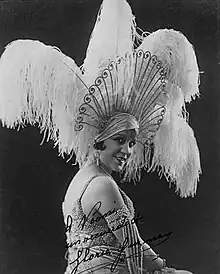Gloria Guzmán
Gloria Guzmán (1902–1979) was a Spanish-born Argentine vedette and actress who performed in the early Argentine theater.
Gloria Guzmán | |
|---|---|
 Gloria Guzmán 1926 | |
| Born | 15 April 1902 |
| Died | 18 September 1979 (aged 77) |
| Nationality | Spanish |
| Occupation(s) | actress, vedette |
| Years active | 1920s–1950s |
Biography
Gloria Guzmán was born on 15 April 1902[1] (or possibly 1894)[2] in Vitoria, Alava, Spain.[1] She arrived in Argentina in 1924 with a zarzuela company and had her debut in the play Las camisas negras.[2] By 1926, she was dubbed as one of the three great "Bataclanas" (showgirls)of the Maipo Theater along with Carmen Lamas and Iris Marga.[3]
In 1931, she began making films debuting in Luces de Buenos Aires with Sofía Bozán and Pedro Quartucci.[4] That same year, she starred in Un caballero de frac directed by Roger Capellani and Carlos San Martín with Roberto Rey and Rosita Díaz Gimeno.[5]
In 1936, she filmed Radio Bar directed by Manuel Romero with starring alongside Olinda Bozán and Carmen Lamas.[6] Cuatro corazones (1939) directed by Miguel Gómez Bao and Carlos Schliepper paired her with Irma Córdoba, Herminia Franco and Eduardo Sandrini.[7]
Guzmán had her own theater company sometimes working alone as "Compañia Argentina de Comedia Gloria Guzmán" as she did for the 1941 staging of “Julio Sandoval candidato a concejal” by Armando Moock[8] and sometimes in tandem with others. In 1945, her "Compañía de Gloria Guzmán y Juan Carlos Thorry" put on three plays: “No salgas esta noche” by Sixto Pondal Ríos and Carlos Olivari, “Mi Amor es un león” by Lazlo Fodor, and “Los maridos engañan de 7 a 9” by Ríos and Olivari.[9] The following season she and Thorry went on the road touring in Mexico[10] and then Spain through the end of 1947.[11]
In 1954, she returned to film, starring in Tren internacional directed by Daniel Tinayre with Mirtha Legrand and Alberto Closas[12] and the following year Guzmán made Pájaros de cristal under the direction of Ernesto Arancibia with Mecha Ortiz and Alba Arnova.[13]
Guzman filmed two films in the 1960s: Yo quiero vivir contigo (1960)[14] and María M. (1964)[15] and her last two films in the 1970s: Disputas en la cama (1972)[16] and La conquista del paraíso which was filmed in 1979 and 1980 released in 1981, after Guzmán's death.[17]
Guzmán died on 18 September 1979 in Buenos Aires.[1]
Filmography
- The Lights of Buenos Aires (1931)
- A Gentleman in Tails (1931)
- Radio Bar (1936)
- Cuatro corazones (1939)
- Tren internacional (1954)
- Pájaros de cristal (1955)
- Yo quiero vivir contigo (1960)
- María M. (1964)
- Disputas en la cama (1972)
- La conquista del paraíso (1980)
References
- "Gloria Guzmán". Cine nacional (in Spanish). Buenos Aires, Argentina: Cine nacional. Retrieved 18 July 2015.
- Schoo, Ernesto (7 May 2008). "La catedral de la revista". La Nacion. Retrieved 18 July 2015.
- "Historia 1926". Maipo (in Spanish). Buenos Aires, Argentina: Teatro Maipo. Retrieved 18 July 2015.
- Evaristo, César (2013). 100 tangos de oro (in Spanish) (2 ed.). Argentina: Ediciones LEA. ISBN 978-9-876-34727-3. Retrieved 18 July 2015.
- Keller, Gary D. (1997). A biographical handbook of Hispanics and United States film. Tempe, Ariz.: Bilingual Press. p. 185. ISBN 978-0-927-53465-9.
- Etling, Laurence (2011). Radio in the Movies a History and Filmography, 1926-2010. Jefferson: McFarland & Co., Publishers. p. 177. ISBN 978-0-786-48616-8. Retrieved 19 July 2015.
- Santos Discépolo, Enrique (2001). Qué "sapa", señor? (in Spanish). Argentina: Corregidor. p. 16. ISBN 9789500513715. Retrieved 19 July 2015.
- Pellettieri, Osvaldo; Burgos, Nidia (2007). Historias del Teatro Argentino: en las provincias, Volumen ii (in Spanish) (1a ed.). Buenos Aires, Argentina: Galerna S.R.L. p. 433. ISBN 978-950-556-507-8. Retrieved 19 July 2015.
- "Pellettieri & Burgos (2007)", p352,
- "México vio en Gloria Guzmán a la encarnación de la atómica". Acceder (in Spanish). Buenos Aires, Argentina: Ministerio de Cultura. Retrieved 19 July 2015.
- "Gloria Guzmán se marchó a España". Acceder (in Spanish). Buenos Aires, Argentina: Ministerio de Cultura. Retrieved 19 July 2015.
- Amador, María Luisa; Ayala Blanco, Jorge (1985). Cartelera cinematográfica, 1950-1959 (in Spanish) (1 ed.). México: Centro Universitario de Estudios Cinematográfico, Dirección General de Difusión Cultural, Dirección Editorial, UNAM. p. 288. ISBN 978-968-837-327-9.
- "Pájaros de cristal". Cine Nacional (in Spanish). Buenos Aires, Argentina: Cine Naciona. Retrieved 19 July 2015.
- "Yo quiero vivir contigo (1960)". Cine Nacional (in Spanish). Buenos Aires, Argentina: Cine Naciona. Retrieved 19 July 2015.
- "María M. (1964)". Cine Nacional (in Spanish). Buenos Aires, Argentina: Cine Naciona. Retrieved 19 July 2015.
- "Disputas en la cama (1972)". Cine Nacional (in Spanish). Buenos Aires, Argentina: Cine Naciona. Retrieved 19 July 2015.
- "La conquista del paraíso (1980)". Cine Nacional (in Spanish). Buenos Aires, Argentina: Cine Naciona. Retrieved 19 July 2015.